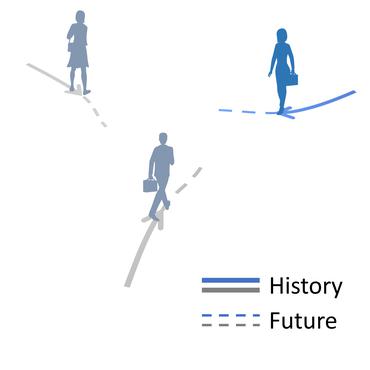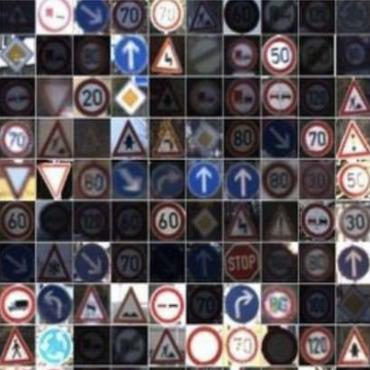Search Results for author: Yiqi Zhong
Found 16 papers, 9 papers with code
An Extensible Framework for Open Heterogeneous Collaborative Perception
1 code implementation • 25 Jan 2024 • Yifan Lu, Yue Hu, Yiqi Zhong, Dequan Wang, Yanfeng Wang, Siheng Chen
In this paper, we introduce a new open heterogeneous problem: how to accommodate continually emerging new heterogeneous agent types into collaborative perception, while ensuring high perception performance and low integration cost?
Self-Supervised Bird's Eye View Motion Prediction with Cross-Modality Signals
1 code implementation • 21 Jan 2024 • Shaoheng Fang, Zuhong Liu, Mingyu Wang, Chenxin Xu, Yiqi Zhong, Siheng Chen
Learning the dense bird's eye view (BEV) motion flow in a self-supervised manner is an emerging research for robotics and autonomous driving.
The Efficiency Spectrum of Large Language Models: An Algorithmic Survey
1 code implementation • 1 Dec 2023 • Tianyu Ding, Tianyi Chen, Haidong Zhu, Jiachen Jiang, Yiqi Zhong, Jinxin Zhou, Guangzhi Wang, Zhihui Zhu, Ilya Zharkov, Luming Liang
The rapid growth of Large Language Models (LLMs) has been a driving force in transforming various domains, reshaping the artificial general intelligence landscape.
MMVP: Motion-Matrix-based Video Prediction
1 code implementation • ICCV 2023 • Yiqi Zhong, Luming Liang, Ilya Zharkov, Ulrich Neumann
A central challenge of video prediction lies where the system has to reason the objects' future motions from image frames while simultaneously maintaining the consistency of their appearances across frames.
Backdoor Attacks Against Incremental Learners: An Empirical Evaluation Study
no code implementations • 28 May 2023 • Yiqi Zhong, Xianming Liu, Deming Zhai, Junjun Jiang, Xiangyang Ji
Large amounts of incremental learning algorithms have been proposed to alleviate the catastrophic forgetting issue arises while dealing with sequential data on a time series.
Meta-Optimization for Higher Model Generalizability in Single-Image Depth Prediction
no code implementations • 12 May 2023 • Cho-Ying Wu, Yiqi Zhong, Junying Wang, Ulrich Neumann
We instead propose fine-grained task that treats each RGB-D pair as a task in our meta-optimization.
 Ranked #33 on
Monocular Depth Estimation
on NYU-Depth V2
Ranked #33 on
Monocular Depth Estimation
on NYU-Depth V2
TBP-Former: Learning Temporal Bird's-Eye-View Pyramid for Joint Perception and Prediction in Vision-Centric Autonomous Driving
no code implementations • CVPR 2023 • Shaoheng Fang, Zi Wang, Yiqi Zhong, Junhao Ge, Siheng Chen, Yanfeng Wang
Second, a spatial-temporal pyramid transformer is introduced to comprehensively extract multi-scale BEV features and predict future BEV states with the support of spatial-temporal priors.
 Ranked #2 on
Bird's-Eye View Semantic Segmentation
on nuScenes
(IoU ped - 224x480 - Vis filter. - 100x100 at 0.5 metric)
Ranked #2 on
Bird's-Eye View Semantic Segmentation
on nuScenes
(IoU ped - 224x480 - Vis filter. - 100x100 at 0.5 metric)
Where2comm: Communication-Efficient Collaborative Perception via Spatial Confidence Maps
2 code implementations • 26 Sep 2022 • Yue Hu, Shaoheng Fang, Zixing Lei, Yiqi Zhong, Siheng Chen
Where2comm has two distinct advantages: i) it considers pragmatic compression and uses less communication to achieve higher perception performance by focusing on perceptually critical areas; and ii) it can handle varying communication bandwidth by dynamically adjusting spatial areas involved in communication.
 Ranked #1 on
Monocular 3D Object Detection
on CoPerception-UAVs
Ranked #1 on
Monocular 3D Object Detection
on CoPerception-UAVs
Aware of the History: Trajectory Forecasting with the Local Behavior Data
no code implementations • 20 Jul 2022 • Yiqi Zhong, Zhenyang Ni, Siheng Chen, Ulrich Neumann
In this work, we re-introduce this information as a new type of input data for trajectory forecasting systems: the local behavior data, which we conceptualize as a collection of location-specific historical trajectories.
Collaborative Uncertainty Benefits Multi-Agent Multi-Modal Trajectory Forecasting
no code implementations • 11 Jul 2022 • Bohan Tang, Yiqi Zhong, Chenxin Xu, Wei-Tao Wu, Ulrich Neumann, Yanfeng Wang, Ya zhang, Siheng Chen
Further, we apply the proposed framework to current SOTA multi-agent multi-modal forecasting systems as a plugin module, which enables the SOTA systems to 1) estimate the uncertainty in the multi-agent multi-modal trajectory forecasting task; 2) rank the multiple predictions and select the optimal one based on the estimated uncertainty.
Exploiting the Potential of Datasets: A Data-Centric Approach for Model Robustness
1 code implementation • 10 Mar 2022 • Yiqi Zhong, Lei Wu, Xianming Liu, Junjun Jiang
Robustness of deep neural networks (DNNs) to malicious perturbations is a hot topic in trustworthy AI.
Shadows can be Dangerous: Stealthy and Effective Physical-world Adversarial Attack by Natural Phenomenon
1 code implementation • CVPR 2022 • Yiqi Zhong, Xianming Liu, Deming Zhai, Junjun Jiang, Xiangyang Ji
A new type of non-invasive attacks emerged recently, which attempt to cast perturbation onto the target by optics based tools, such as laser beam and projector.
V2X-Sim: Multi-Agent Collaborative Perception Dataset and Benchmark for Autonomous Driving
no code implementations • 17 Feb 2022 • Yiming Li, Dekun Ma, Ziyan An, Zixun Wang, Yiqi Zhong, Siheng Chen, Chen Feng
Vehicle-to-everything (V2X) communication techniques enable the collaboration between vehicles and many other entities in the neighboring environment, which could fundamentally improve the perception system for autonomous driving.
Behind the Curtain: Learning Occluded Shapes for 3D Object Detection
2 code implementations • 4 Dec 2021 • Qiangeng Xu, Yiqi Zhong, Ulrich Neumann
Finally, the probability of occupancy is also integrated into a proposal refinement module to generate the final bounding boxes.
 Ranked #2 on
3D Object Detection
on KITTI Cars Moderate
Ranked #2 on
3D Object Detection
on KITTI Cars Moderate
Collaborative Uncertainty in Multi-Agent Trajectory Forecasting
no code implementations • NeurIPS 2021 • Bohan Tang, Yiqi Zhong, Ulrich Neumann, Gang Wang, Ya zhang, Siheng Chen
2) The results of trajectory forecasting benchmarks demonstrate that the CU-based framework steadily helps SOTA systems improve their performances.
Deep RGB-D Canonical Correlation Analysis For Sparse Depth Completion
1 code implementation • NeurIPS 2019 • Yiqi Zhong, Cho-Ying Wu, Suya You, Ulrich Neumann
Such a transformation enables CFCNet to predict features and reconstruct data of missing depth measurements according to their corresponding, transformed RGB features.








